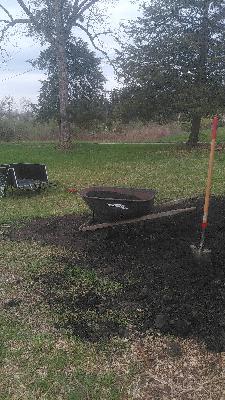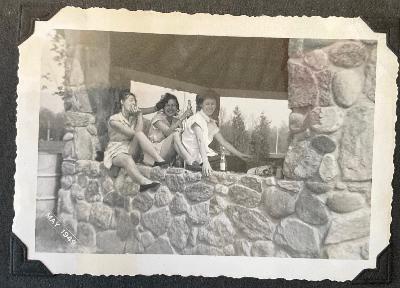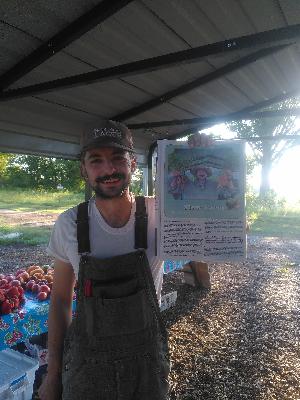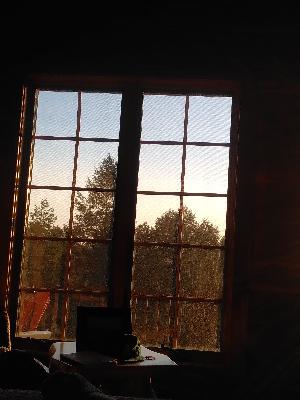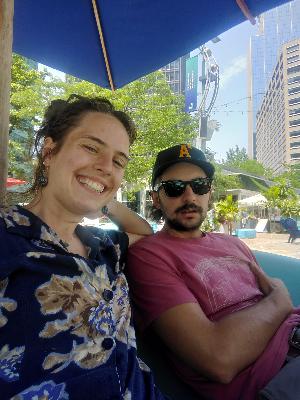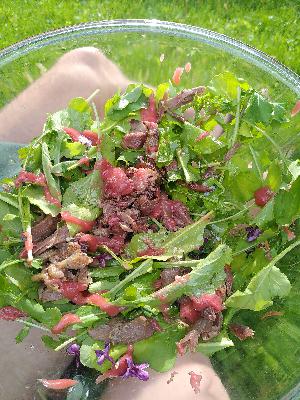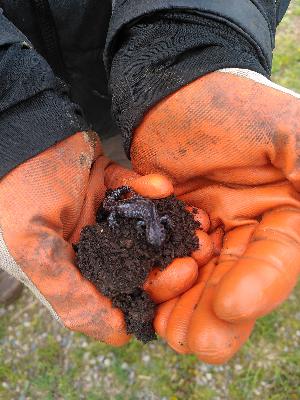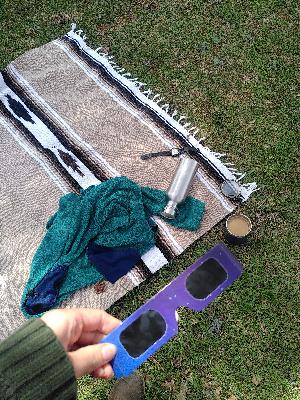Ep.21- Convocation
Description
Welcome to Scrap Farm, the newsletter/podcast where I discuss living seasonally, adapting to climate chaos and whatever else, all in the context of trying to start a farm in the UK (probably, maybe).
If you’re new here, hello, hi. To those returning, welcome back!
I report to you live from the trenches of job applications. For those of you unaware of my current situation, I need to get a job that pays £29k annually for my partner to be allowed into the country. During the Visa process, it took us just a little too long to figure this out and we are now in our respective family homes (he in California and myself in London) as we sort this s**t out. By sort this s**t out I mean frantically applying for jobs while also looking into loans in case we return to Michigan (where we were running a farm for the past two years).
It’s a weird time.
Made weirder still by the fact that the first ‘interview’ I had in a while was actually for an MLM (a Pyramid Scheme, apparently legal). Honestly, there were red flags from the start; the first ‘interview’ was just being talked at by a ‘director’ of the company, then there was an ‘essential questionnaire’ that just asked about availability, then a phone call congratulating me on getting that far (I hadn’t spoken to anyone yet).
The real kicker came in the second ‘interview’ when my interviewer, a 19-year-old (fresh out of his A Levels) and I were put in a breakout room. We were all Polish. I honestly think this was so we would ‘connect’ with the interviewer and not look too closely at the company or its scammy scummy nature. After another half an hour of being talked at, my blood was boiling as I realised how the ‘payment system’ worked. Either become part of the ‘management team’ and endlessly recruit or become a door-to-door salesperson for British Gas (and get paid on only commission). They asked me which route I was interested in. I answered honestly; neither. The interviewer even tried to neg me into the job, ‘Didn’t I want to learn sales’, as if years of experience were suddenly negated. As if I didn’t have the drive to do their shitty job. When asked I refused to tell them what their red flags were, no way was I helping them improve. Righteous indignation is one hell of a drug.
The rest of that morning I spent on the phone with Trading Standards reporting them and then to the Equalities and Human Rights Commission (which I was directed to but technically I wasn’t actively discriminated against they just were scuzzy about dividing people up based on ethnicity). I wasn’t expecting anything from this but to get something on record about the company’s hiring practices. Sufficed to say I don’t think much will come of reporting them but I really appreciate everyone I talked to and their guidance on how to proceed.
And if you’re applying for a job at Steppe2: don’t. RUN.
The s**t part of all this is that this company is getting impressionable young people to work for poverty wages. They expect them to live off the love of the grind. And if they survive that, to bring more people in on the scheme. I would have fallen for it if I was fresh out of sixth form too. Luckily I’m thirty and bitter.
Oh, yeah, I turned THIRTY on Christmas Eve. Or as I call it ✨ Magday ✨
The other s**t part of this whole ordeal was that I was so desperate for a job, so willing to look at any opportunity, that I ignored several red flags. I am privileged enough to not have to take this scammy job, but many people are not. Absolutely terrified for anyone who moves to London for it. Or for this to be someone’s first experience in the workforce.
Anyway, the job hunt continues.
Current Farm Updates
Ok, yes, I know, I have no current farm. But I wanted a separate space for the Oxford Real Farming Conference which I attended in person last week. While I don’t have a farm to represent at the moment, it was a valuable opportunity to connect with people in the agricultural scene here in the UK. To refill my cup and to get as mycelial as possible.
On the theme of labour, it was wonderful to hear about the formation of SALT Union, and their joining of the larger Bakers and Allied Food Workers Union, which allows them to provide more for their members. SALT stands for Solidarity Across Land Trades and is for all workers of the land. They made a valid and often overlooked point that the agroecological movement pushed for the ends to justify the means at times, that the dream of a more ecologically integrated future is supposed to be enough to overcome the abuses of power farm workers experience. This is unsustainable, we can’t build a better future by burning through passionate workers. Their report on how workers become ‘Burntout, Overworked and Underpaid’ can be found on their website. I strongly encourage anyone working the land, or who was forced to leave because the work became unsustainable for them, to join this union.
One of the most poignant moments in the conference was hearing about migrant workers from Latin America who had been brought into the UK on Seasonal Workers Visas by the company Haygrove in Herefordshire. After being kept in unsanitary conditions and being actively discriminated against they went on strike, the result of which is that they were asked to pay back the cost of their visas plus interest! Eventually a ‘deal’ was reached with the workers that they would not have to pay this back but would instead have their flights home paid for if they left immediately. Once off the property, the workers were told they were in breach of contract and practically abandoned in London. This was in 2023. Some have yet to return home.
There will be a protest against the government’s neglect of these workers outside the Home Office on 24th January at Midday.
It is so easy when farming, when trying to farm, when caught in the daily grind, to not look up and think about how much worse others have it. But if we are to really transform the food system, we must protect those who are the most vulnerable to exploitation. As always the Land Workers Alliance and La Via Compesina, who have been working tirelessly to build solidarity, especially with farmers in Palestine, are a great example of this. But I’m also so excited by the creation of SALT, it is so very necessary.
Another heartening moment was hearing about the twinning of Battir Co-operative Society for Food Processing and Production in the West Bank with Fruit Works near Leeds. Farmers from both organisations have been sharing information and building tangible bridges, including a virtual marmalade-making session.
Another session I really enjoyed was about funding the Agroecological transition, where the point was made that farming already has loads of funding but unfortunately, it is all funnelled into massive players. What is needed is a damming of the flow of capital and a redirecting towards a just and sustainable food system. In this session, I heard about the push for a Basic Income for Farmers, which is beginning to trail the concept in small clusters. A Basic Income would allow farmers, who earn well below the average income in this country, to be able to focus on suitability without sacrificing the bottom line or their mental health. As Alex Heffron points out “Farmers cannot go green if they are in the red”.
Another person I took almost feverish notes on was Meshark Sikuku of Ripple Effect, who is working to help rural subsistence farmers in East Africa transition to more productive, profitable and vitally sustainable farming practices. He spoke of the adoption of amaranth and other climate-resilient crops, the use of keyhole gardens for water preservation and the ‘push-pull’ method of integrated pest management. Along with their rural programs, Ripple Effect runs a Garden Twinning Project to help build international solidarity with subsistence farmers.
And finally, I have already downloaded quite a few reports from Nourish Scotland, where I was introduced to the concept of Public Diners, an alternative to food banks. Or at least a complement to them. In a Public Diner, which would ideally be supplied by local farms, people can eat nutritious, local food for free with the people in their community. Bringing people together and reducing the pressure on households to provide and cook every meal.
I feel this only briefly touches the surface of the information I gathered at the conference. Thank goodness they make all their sessions available on YouTube for me to watch back and share liberally. Though at times the conference felt overwhelming, as there were so many problems to solve, so many challenges we face, it was also very hopeful. There are people working on each of these and places where I can and will lend my energy.
Future Farm Updates
Ah yes, a little less hopeful on this front. My partner and I had a very informative discussion with the FSA about a loan for land we looked at in Michigan. Land m



